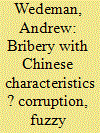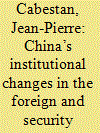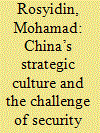| Srl | Item |
| 1 |
ID:
154437


|
|
|
|
|
| Summary/Abstract |
Leftist political parties and labor unions that had stood at the forefront of the collective effort to protect Article 9 until the early 1990s have stepped back to some extent as they have shrunk and fragmented. Instead, advocacy groups whose influence is often enhanced by ‘leftist elites’ have now seemed to come more to the fore, thereby raising certain questions: What roles do the leftist elites play in those groups? How are such groups organized? Who exactly are the leftist elites? This article intends to address questions regarding the leftist elites, as well as the organization and development of these advocacy groups, in particular the Article 9 Association.
|
|
|
|
|
|
|
|
|
|
|
|
|
|
|
|
| 2 |
ID:
154434


|
|
|
|
|
| Summary/Abstract |
This paper addresses the question of whether the way bribery is practiced in China is such that corruption might be compatible with rapid economic growth during the boom years between 2000 and 2007. In particular, it examines whether bribery based on diffuse reciprocity transforms a corrupt relationship from one based on short-term egoistic gains (looting) to one based on long-term gains (profit maximizing), with the assumption that such a form of bribery will lead the parties to maximize total gains and hence will encourage long-term growth rather than short-term predatory looting. More broadly, the paper inquires whether a regime of informal property rights based on bribery and diffuse reciprocity might compensate for the shortcomings of an imperfectly constructed and incomplete set of formal property rights such as has emerged in post-Mao China and thereby improve the prospects for economic growth. The paper concludes that while bribery based on diffuse reciprocity may encourage the parties directly involved in such corrupt exchanges to maximize their total long-term gains, so long as bribery remains a private good and an informal property rights regime based on bribery remains subject to abrupt and catastrophic revision due to its illegal nature, “bribery with Chinese characteristics” cannot be characterized as growth enhancing and thus cannot be a major explanation for why the Chinese economy grew rapidly during the “third boom.”
|
|
|
|
|
|
|
|
|
|
|
|
|
|
|
|
| 3 |
ID:
154435


|
|
|
|
|
| Summary/Abstract |
This article focuses on the institutional changes that have occurred in the foreign and security policy realm since Xi Jinping became General Secretary of the Chinese Communist Party (CCP) in November 2012. The establishment of a National Security Commission (NSC) in November 2013, the power centralization in the Central Military Commission (CMC) and the reorganization of the CCP leadership of the People’s Liberation Army (PLA) as well as the major branches of the PLA, the reorganization in March 2013 of the various civilian maritime security agencies and the establishment in December 2013 of a Cybersecurity and Informatization Leading Small Group (LSG) are the most striking organizational reforms introduced by Xi. But other institutional changes have taken place as Xi’s inclination to rely on a larger number of actors and in particular to give his closer political allies a bigger role also in foreign and security policy. These changes have obviously helped concentrate more power in the hands of Xi Jinping and, to some extent, better coordinate domestic and external security objectives and on the whole have well served China’s foreign and security policy’s assertiveness and initiatives. However, these changes have only partly reduced the power fragmentation that has developed extensively under Hu Jintao, and they have not contributed to institutionalizing decision-making processes at the top of the CCP and the state apparatuses. On the contrary, it appears that through these changes Xi has not only created new bureaucratic overlaps and tensions but also, in relying more on his own advisers, fed frustrations and competitions among agencies and officials, in other words, new forms of power fragmentation.
|
|
|
|
|
|
|
|
|
|
|
|
|
|
|
|
| 4 |
ID:
154436


|
|
|
|
|
| Summary/Abstract |
The most challenging task in creating peace in the South China Sea is how to deal with Chinese assertive behavior. This is important since many proposals of the regional security architecture have failed to engage China in order to establish a long-lasting peace in the region. This paper seeks to explain the failure of security management in the South China Sea. Using the concept of strategic culture deriving from constructivism in International Relations, this paper argues that China’s strategic culture is the main factor behind the aggressive behavior in the South China Sea. This culture is rooted from the pre-modern China’s history that has distinct perspective from the Westphalian international law with regard to territorial disputes. This cultural dimension, not the material one, is the key to rethinking security management in the region.
|
|
|
|
|
|
|
|
|
|
|
|
|
|
|
|